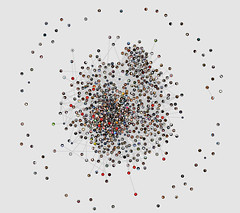 Image by Rafiq Phillips via Flickr
Image by Rafiq Phillips via Flickr
The solution to the problem of authentication on the Internet has so far eluded us. None of the more secure methods (e.g., digital certificates, OpenID, security tokens) have gained wide traction and the dominant authentication system we have in place today (username/password combination) is so broken that it does not stand a chance against Nigerian phishermen.
Mostly by coincidence Facebook has found out that people who know you are also the most authoritative source for confirming your identity. By building your social graph you are building your on-line identity. Facebook, as the keeper of your social graph, can pass upon your request your social graph to some other web site in order for you to confirm your identity. Building a social graph takes time and requires constant maintenance resulting in a substantial user lock-in that Facebook enjoys.
We have put up with effort required for building the social graph because Facebook gave us some very sweet incentives. 400M+ users are a living proof how strong incentives friday party's photos and juicy comments can be. But our social graphs are now mostly built. In order to keep us interested, Facebook is providing us with ever more incentives (videos, games, news, chat, e-mail, ...). But with every new incentive that seduces us, more and more about our lives can be deduced from the river of news we generate. While our social graph included only our like-minded friends, total exposure of our personality on Facebook did not matter. But with moms and bosses joining Facebook, teenagers and tweens will leave (with others to follow soon) for more private quarters or hide themselves under a false name.
I think Facebook is making a capital mistake by making us spend more time using it. With every piece of information about ourselves exposed on Facebook, the chances are increasing that our social graphs will collapse due to unwanted exposure of our personal details. The situation very much reminds me of the year 2000 when portals such as Yahoo and AOL were competing for users' eyeballs time. As history testifies, the whole portal edifice collapsed with arrival of Google who made a fortune by making users leave Google's web site as fast as possible.
I think Facebook should follow Google's recipe of getting out of user's way and transform itself into a simple Facebook button on every web site thus becoming the dominant authentication method on the Internet and collecting hundredths billions dollars in transaction fees for (virtual) goods along the way.
I feel a premonition that Facebook is already too big to be capable of simplification of its business model. Even though Facebook feels like the king of the world at the moment, it might very well end the same as Yahoo and AOL did. I think now it's the perfect time for the onset of a company that would do social authentication that does not suck, just as Google provided us with a web search that doesn't suck a decade ago. Just to make fun out of myself ten years from now, I'll make a prediction that Foursquare will be the David who will trounce the Facebook Goliath.
---
As a side note, let me note that Twitter is no alternative to Facebook as a authentication method since Twitter's "follower" model does not provide a chain of trust. Well, unless Twitter solves the scalability problem of the verified account approach.


The story is evolving http://www.readwriteweb.com/archives/cartoon_this_user_has_been_suspended.php
OdgovoriIzbriši